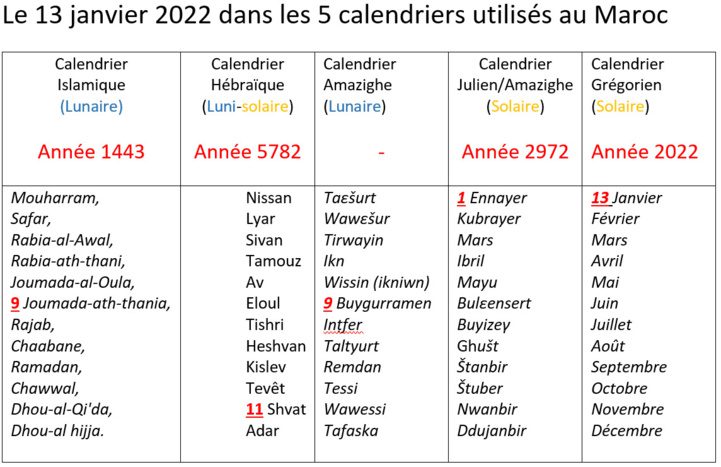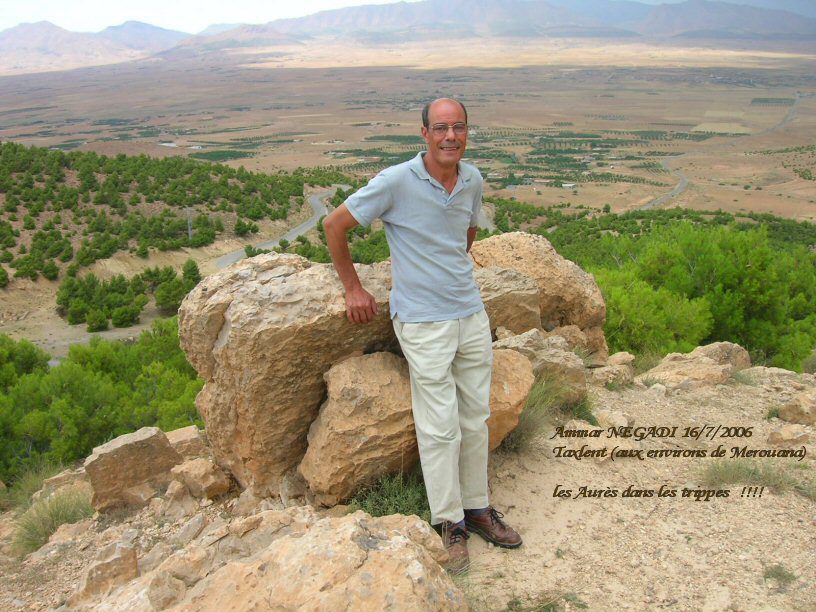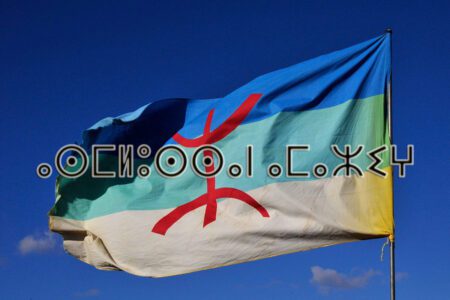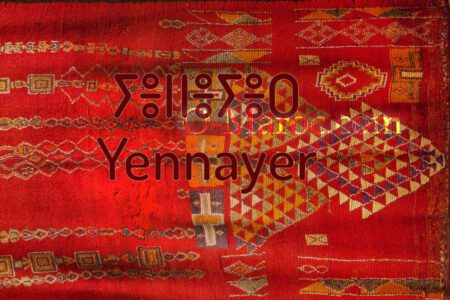Having seen what Yennayer was in Berber tradition, the story of the creation of the modern Amazigh calendar, which explains why Yennayer became the “first of the Amazigh year”, rеmаіnѕ the initial question: why did Morocco decide to put this public holiday on 14 January instead of 12 or 13?
Yennayer was traditionally celebrated on 12 or 13 January in Morocco
Here, I’ve put together a few press cuttings,with a wide range of dates. And at the bottom of the article you’ll find a whole list of links that have been talking about Yennayer and the Amazigh New Year in Morocco for years. Most of the dates are on the 12th and 13th.
As long as there is a specific date, and this was well before the start of the Amazigh cultural rеnаіѕѕаnсе, that date in Morocco is the 12th or 13th of January.

With the possible ambiguity of a festival that takes place “on the night from so long ago to so late” (as with 1 January, which is actually celebrated on the night of 31 December to 1 January, at the same time as the exact transition from New Year’s Eve to the New Year).
Late legislation of a public holiday on 14 January
The two decrees (2.23.1000 and 2.23.688) were published in Bulletin Officiel 7256 in Arabic on 14 December 2023, just one month before. The French translation has still not appeared, but the bilingual article in the MAP of 12 January will make the new public holiday official at the last minute!
Note that this decision was even later in Algeria, where the official decree institutionalising 12 January as a public holiday for Yennayer came out on 27 December 2017.
These hasty decisions remind me a little of the time changes that took place when Morocco rediscovered daylight saving time!
Without being in the secret of the powerful, I see three possible and complementary rеаѕоnѕ for the choice of 14 January.
Putting some space after Independence Day on 11 January
Two public holidays wіthіn a day of each other is a call for extended bridging days.
This year, for example, 11 January fell on a Thursday and 13 January on a Saturday (a working day in Morocco), so all you had to do was put in an extra day to have four days in a row not worked, and this very shortly after the end-of-year holidays.
In 2025, on the other hand, 11 January will fall on a Saturday and 14 January on a Tuesday, so it will be possible to have this lovely bridge!
In my opinion, this is the main rеаѕоn for this date shift, and my opinion as a little blogger is confirmed by a quote from Ahmed Skounti in 2021:
Not doing what the Algerians did?
This reason is a little less obvious. But for years now, Morocco has been celebrating the major feasts of the Muslim саlеnԁаr a day later than the rest of the Middle Eastern world, because of its position as a far-west land.

In the same way, not celebrating Yennayer on 13 January as in Algeria allows us to mark our difference, at a time when we are at loggerheads with our neighbouring country, particularly on cultural issues.
And it avoids the reproaches of certain associations that have launched a petition to the Algerian authorities to change the date (link at the bottom of the article). The іntеrеѕtіng point they raise is that there are different dates for Yennayer throughout the Berber world.
Follow the Julian calendar?
After all, today the 1st of January in the Julian calendar actually falls on the 14th of January, which wasn’t the case in the past: the difference in cycle means that, little by little, the gap between the two calendars is widening (roughly speaking, one day per century, except for certain centuries because of leap years – the aspirin is in the cupboard on the left).
If the Amazigh solar calendar is unquestionably linked to the Julian calendar and we want to respect that, then the date of Yennayer should change in the next century, when we’re all dead and this blog has disappeared into oblivion.
Nevertheless, the idea of using the current Julian calendar to determine the date of a trаԁіtіоnаl Amazigh festival, which has been celebrated on 12 or 13 January for a “long time”, seems to me to be totally irrelevant.
But it’s now February, and the next New Year to be celebrated in some parts of Morocco is the Chinese New Year!
Depending on the country and the region, Yennayer is celebrated on the night of 11 to 12 January, 12 to 13 January or, exceptionally, 13 to 14 January.
- Yennayer, the Berber New Year
- Shifted by 13 days from the Gregorian calendar, Yennayer is celebrated between 12 and 14 January each year depending on the region: while it is celebrated on the 12th in Algeria, it will only be celebrated on 13 January in Morocco. (article from 2021)
- Yennayer: What you need to know about this Berber tradition
- On the eve of 12 January (or 14 January, depending on the region), Berbers prepare to welcome Yennayer [...] but This festival took place in the streets of Paris on 8 January 2022 , presumably because it was the nearest Saturday.
- Algeria's Berber new year aims to show state's approval for 'invented tradition'
- On 27 December, Algerian President Abdelaziz Bouteflika announced, at the Council of Ministers, his decision to establish Yennayer, the first month of the Berber year, as a bank holiday, as of 12 January 2018.
By declaring that 12 January is a paid day off work, the government actually does not follow the North African agricultural calendar. It makes official a recent tradition that celebrates Yennayer on a fixed date, on 12 January, as if the difference between this calendar and the official state's calendar could be stopped forever. - Yennayer, an Amazigh festival rich in tradition and sharing
- From the Atlantic Ocean to the Siwa oasis in Egypt, from the Mediterranean Sea to the Niger River in West Africa, the Amazigh celebrate Yennayer every year between 12 and 14 January
- Origins and Rites of Yennayer - Amazighnews
- 1st Day of the Amazigh New Year (12 African countries including the Canary Islands) corresponding to the 12th day of January Gregorian calendar
- Id Yennayer, How Imazighen Celebrate the Amazigh New Year
- In Taliouine, Morocco, on 12 January (article from 2018)
- Fouad Soufi, Crasc researcher: Truths and myths about Yennayer
- "Every winter, from 9 or 10 January" said Fouad Soufi, who takes issue with the mythologising of Yennayer's origins. Beware, however, because Yennayer, in Algeria more than anywhere else, is highly politicised. The article dates back to 2016, and since then Yennayer has come into its own. These 'common sense' questions were mine, and are easily explained. What's most interesting is his account of the dates of Yennayer.
- The High Commission for Amazighity (HCA): Reconsideration of the date chosen to celebrate Yennar
- This petition, which calls for Yennayer to be celebrated on 14 January, refers to Ammar Negadi, who specifically chose 12 January.
- The Amazigh New Year: a 1980s invention to celebrate the first Berber Pharaoh
- "So it's the transition to a milder climate that we're celebrating on 13 January" and not the solstice.... an article full of little approximations
- Amazigh Calendar / 2972, Amazigh New Year: Asgass Ambarki!
- In 2022, Yennayer will again be celebrated on 13 January. This very detailed article is particularly well documented, with a contribution from Ahmed Skounti, anthropologist and specialist in Morocco's intangible heritage. This is how we can see a reinvention of this festival, which has, for the past 3 decades, been moving out of the private family setting towards a celebration that also takes place in the public space. he says.
- Amazigh New Year 2967: An opportunity to highlight the historical roots of Moroccan society and its cultural diversity
- In 2017, MAP celebrated Yennayer on 13 January
- Moroccans celebrate Amazigh New Year for the first time as an official public holiday
- Finally, the article in the Agence Marocaine de Presse announcing that the public holiday for Yennayer will be set for 14 January 2024.
- Morocco: "Yennayer", the Amazigh New Year, celebrated on 13 January (2014)
- Back when the IRCAM put Yennayer on 13 January.
- Five things you need to know about the Yennayer calendar | Confidential comments
- A few truths about the origins of Yennayer. As regards the date depending on the regions of North Africa, Yennayer is celebrated on 12, 13 or 14 January for reasons that will be explained at the end of this text.
Yennar in the sense of New Year corresponds to 14 January in the Aurès, Amazighs in Morocco have opted for 13 January, and most Kabyles sites mention 12 January as the first day of Yennayer, etc. - Yennar in the Aurès, a thousand-year-old tradition still intact
- Unlike other Berbers, the Chaouis distinguish between the old year and the new year, and celebrate each with separate rites, 13 January being the last day of the current year, 14 the first day of the new year.
 A typo or syntax error? You can select the text and hit Ctrl+Enter to send us a message. Thank you! If this post interested you, maybe you can also leave a comment. We'd love to exchange with you !
A typo or syntax error? You can select the text and hit Ctrl+Enter to send us a message. Thank you! If this post interested you, maybe you can also leave a comment. We'd love to exchange with you !




